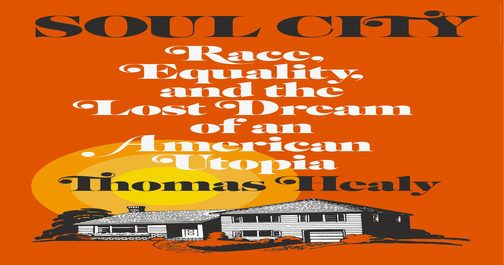Thomas Healy was born in 1969, the same year that Floyd McKissick launched Soul City, his dream to build a new town in Warren County that would boast 50,000 residents and pump life into a historically poor area of North Carolina.
Healy, although born and raised in North Carolina, only learned about Soul City when he was a reporter in the 1990’s at The News & Observer in Raleigh, he told Bill Harris and Mark Pace on Thursday’s Town Talk.
And now, the Seton Hall law professor has written a book about the spot where McKissick had envisioned Black people living, working and thriving. But Soul City: Race, Equality, and the Lost Dream of an American Utopia also looks examines misperceptions surrounding Soul City.
One glaring misperception is that McKissick wanted to build an all-Black city an hour north of Durham, Healy said. Then, with the backdrop of protests in Ferguson, Missouri, Healy decided to take a closer look at the story of Soul City and “to tell people about this history and, to some extent, set the record straight.”
McKissick, a Democrat, had some unlikely allies when he was trying to build Soul City, from James Holshouser, the Republican elected governor in 1972 all the way to the White House and Richard Nixon. Although initially skeptical and hostile, Healy noted, the nay-sayers realized what Soul City could do, they were on board.
But not Jesse Helms, newly elected senator from North Carolina. “Helms was hostile to Soul City from the very beginning,” Healy said. Ironically, The News & Observer, no friend of Helms ordinarily, “sort of tag-teamed with Jesse Helms in a way” in opposition to Soul City.
That combined opposition of the newpaper and Helms “was really devastating” for Soul City. Healy opined that if one or the other had not been such vocal opponents, then maybe Soul City would have had a fighting chance at survival.
Unlike suburban areas that grew up around urban areas as bedroom communities, Soul City was plopped in the middle of a rural county with little industry nearby. McKissick was trying to build a city of 50,000 people in a county that had a total population of 16,000 – he would have to clear the land, pave the roads, bring in electricity and then build homes, parks, amenities that would attract residents. And then there would need to be jobs.
It was a classic chicken-egg theory – which would come first, jobs or the city? Industry would demand a skilled workforce to draw from, and residents would have to have a way to make their livelihood in order to relocate, Healy said.
It was a strategic, yet pragmatic move that McKissick made in the summer of 1972 to switch political parties. He became a Republican and supported Nixon. Healy said he felt like this was insurance that would assure Soul City would get the federal dollars from HUD to become a reality.
Soul City got the money, but it wasn’t enough, Healy said. And that type of idealistic thought doesn’t exist today. “It was a super ambitious, audacious project,” Healy said. “If you proposed something like this now, I think people would look at you like you were crazy.”
McKissick did not see his dream come to full reality. He died in 1991, after Soul City had closed. But Healy said he felt McKissick would be heartbroken today to see that spot in Warren County where his dream began.
For complete details and audio click play.
